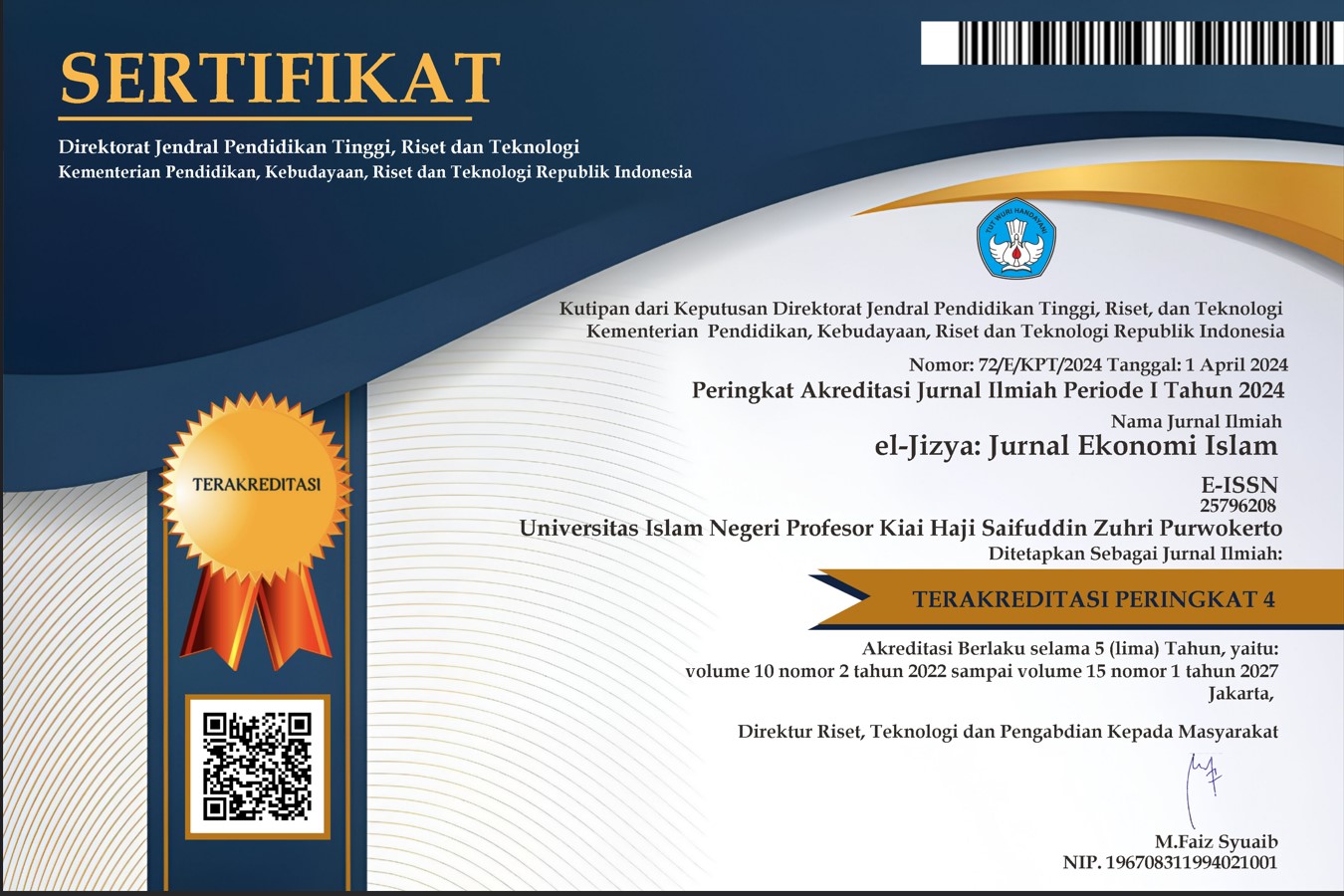Konsumen Muslim: Pengetahuan Produk Halal dalam Keputusan Pembelian Makanan
DOI:
https://doi.org/10.24090/ej.v9i1.4693Keywords:
halal product knowledge, halal logo, consumer behaviour, halal product, experimentAbstract
Being Muslim doesn’t guarantee that someone has adequate halal knowledge. The variety of extracting halal knowledge of Muslim consumers is important because it becomes the basis for their purchase decisions. This paper aims to explore the halal knowledge of Muslim consumers and exprimentally confirm the range of the knowledge. The exploration was carried out through a Focus Group Discussion (FGD). Then, an experiment to 239 Muslim consumers was conducted to confirm the findings of FGD. FGD found participants with a minimum level of halal knowledge use the halal logo Majelis Ulama Indonesia (MUI) or the Indonesian Ulema Council, as the basis for determining the halalness of a product in their purchase decisions. Furthermore, FGD found participants with good halal knowledge use other considerations (for example, the process of slaughtering animals, mentioning the name of Allah SWT) when they do not find the MUI halal logo in determining the halalness of a product. The experiment confirms the different levels of their halal knowledge. The findings imply that products need to include halal logo from MUI, not from other sources, to ease Muslim consumers make buying decisions.References
Al-Otoum, F. J., & Nimri, R. S. (2015). Antecedents of consumers’ behavior towards halal food among Jordanian customers: A Structural Equation Modeling (SEM) approach. Journal of Marketing and Consumer Research, 12.
Amalia, F. A., Sosianika, A., & Suhartanto, D. (2020). Indonesian Millennials’ Halal food purchasing: merely a habit? British Food Journal, 122(4), 1185–1198. https://doi.org/10.1108/BFJ-10-2019-0748
Andriopoulos, C., & Slater, S. (2013). Exploring the landscape of qualitative research in international marketing: Two decades of IMR. International Marketing Review, 30(4), 384–412. https://doi.org/10.1108/IMR-03-2012-0061
Ayyub, R. M. (2015). Exploring perceptions of non-Muslims towards Halal foods in UK. British Food Journal, 117(9), 2328–2343. https://doi.org/10.1108/BFJ-07-2014-0257
Billah, A., Rahman, M. A., & Hossain, M. T. Bin. (2020). Factors influencing Muslim and non-Muslim consumers’ consumption behavior: A case study on halal food. Journal of Foodservice Business Research, 23(4), 324–349. https://doi.org/10.1080/15378020.2020.1768040
Bryman, A. (2016). Social research methods. In Oxford university press. (p. 1).
Chairunnisyah, S. (2017). PERAN MAJELIS ULAMA INDONESIA DALAM MENERBITKAN SERTIFIKAT HALAL PADA PRODUK MAKANAN DAN KOSMETIKA. EduTech: Jurnal Ilmu Pendidikan Dan Ilmu Sosial, 3(2). www.ajijumiono.blogspot.com/2012,
Jaelani, E. (2018). Perlindungan Hukum Terhadap Wisatawan Dalam Rangka Pemanfaatan Produk Dan Jasa Pariwisata Syariah (Halal Tourism). JES (Jurnal Ekonomi Syariah), 3(2). https://doi.org/10.30736/jesa.v3i2.46
Maichum, K., Parichatnon, S., & Peng, K.-C. (2017). The Influence of Attitude, Knowledge and Quality on Purchase Intention towards Halal Food: a Case Study of Young Non-Muslim Consumers in Thailand. IRA-International Journal of Management & Social Sciences (ISSN 2455-2267), 6(3), 354–364. https://doi.org/10.21013/jmss.v6.n3.p3
Miles, M. B., Huberman, A. M., & Saldaña, J. (2014). Qualitative Data Analysis: A Methods Sourcebook. In SAGE publications. SAGE Publications.
MUI. (n.d.). Fatwa MUI No 12 tahun 2009. Retrieved March 26, 2021, from http://mui.or.id/wp-content/uploads/files/fatwa/Standar-sertifikasi-penyembelihan-halal.pdf
Nugrahani, F. (2014). Metode Penelitian Kualitatif. In Solo: Cakra Books (Vol. 1, Issue 1). https://doi.org/10.1016/j.sbspro.2015.04.758
Nurhayati, T., & Hendar, H. (2019). Personal intrinsic religiosity and product knowledge on halal product purchase intention: role of halal product awareness. Journal of Islamic Marketing. https://doi.org/10.1108/JIMA-11-2018-0220
Raco, J. (2018). Metode penelitian kualitatif: jenis, karakteristik dan keunggulannya. OSF Preprints. https://doi.org/10.31219/osf.io/mfzuj
Stobbelaar, D. J., Casimir, G., Borghuis, J., Marks, I., Meijer, L., & Zebeda, S. (2007). Adolescents’ attitudes towards organic food: a survey of 15- to 16-year old school children. International Journal of Consumer Studies, 31(4), 349–356. https://doi.org/10.1111/j.1470-6431.2006.00560.x
Sugiyono. (2013). Metodologi penelitian kuantitatif kualitatif dan R&D. In Alpabeta, Bandung.
Zailani, S., Kanapathy, K., Iranmanesh, M., & Tieman, M. (2015). Drivers of halal orientation strategy among halal food firms. British Food Journal, 117(8), 2143–2160. https://doi.org/10.1108/BFJ-01-2015-0027
Amalia, F. A., Sosianika, A., & Suhartanto, D. (2020). Indonesian Millennials’ Halal food purchasing: merely a habit? British Food Journal, 122(4), 1185–1198. https://doi.org/10.1108/BFJ-10-2019-0748
Andriopoulos, C., & Slater, S. (2013). Exploring the landscape of qualitative research in international marketing: Two decades of IMR. International Marketing Review, 30(4), 384–412. https://doi.org/10.1108/IMR-03-2012-0061
Ayyub, R. M. (2015). Exploring perceptions of non-Muslims towards Halal foods in UK. British Food Journal, 117(9), 2328–2343. https://doi.org/10.1108/BFJ-07-2014-0257
Billah, A., Rahman, M. A., & Hossain, M. T. Bin. (2020). Factors influencing Muslim and non-Muslim consumers’ consumption behavior: A case study on halal food. Journal of Foodservice Business Research, 23(4), 324–349. https://doi.org/10.1080/15378020.2020.1768040
Bryman, A. (2016). Social research methods. In Oxford university press. (p. 1).
Chairunnisyah, S. (2017). PERAN MAJELIS ULAMA INDONESIA DALAM MENERBITKAN SERTIFIKAT HALAL PADA PRODUK MAKANAN DAN KOSMETIKA. EduTech: Jurnal Ilmu Pendidikan Dan Ilmu Sosial, 3(2). www.ajijumiono.blogspot.com/2012,
Jaelani, E. (2018). Perlindungan Hukum Terhadap Wisatawan Dalam Rangka Pemanfaatan Produk Dan Jasa Pariwisata Syariah (Halal Tourism). JES (Jurnal Ekonomi Syariah), 3(2). https://doi.org/10.30736/jesa.v3i2.46
Maichum, K., Parichatnon, S., & Peng, K.-C. (2017). The Influence of Attitude, Knowledge and Quality on Purchase Intention towards Halal Food: a Case Study of Young Non-Muslim Consumers in Thailand. IRA-International Journal of Management & Social Sciences (ISSN 2455-2267), 6(3), 354–364. https://doi.org/10.21013/jmss.v6.n3.p3
Miles, M. B., Huberman, A. M., & Saldaña, J. (2014). Qualitative Data Analysis: A Methods Sourcebook. In SAGE publications. SAGE Publications.
MUI. (n.d.). Fatwa MUI No 12 tahun 2009. Retrieved March 26, 2021, from http://mui.or.id/wp-content/uploads/files/fatwa/Standar-sertifikasi-penyembelihan-halal.pdf
Nugrahani, F. (2014). Metode Penelitian Kualitatif. In Solo: Cakra Books (Vol. 1, Issue 1). https://doi.org/10.1016/j.sbspro.2015.04.758
Nurhayati, T., & Hendar, H. (2019). Personal intrinsic religiosity and product knowledge on halal product purchase intention: role of halal product awareness. Journal of Islamic Marketing. https://doi.org/10.1108/JIMA-11-2018-0220
Raco, J. (2018). Metode penelitian kualitatif: jenis, karakteristik dan keunggulannya. OSF Preprints. https://doi.org/10.31219/osf.io/mfzuj
Stobbelaar, D. J., Casimir, G., Borghuis, J., Marks, I., Meijer, L., & Zebeda, S. (2007). Adolescents’ attitudes towards organic food: a survey of 15- to 16-year old school children. International Journal of Consumer Studies, 31(4), 349–356. https://doi.org/10.1111/j.1470-6431.2006.00560.x
Sugiyono. (2013). Metodologi penelitian kuantitatif kualitatif dan R&D. In Alpabeta, Bandung.
Zailani, S., Kanapathy, K., Iranmanesh, M., & Tieman, M. (2015). Drivers of halal orientation strategy among halal food firms. British Food Journal, 117(8), 2143–2160. https://doi.org/10.1108/BFJ-01-2015-0027
Downloads
Published
03-06-2021
How to Cite
Musthofa, A., & Buhanudin, B. (2021). Konsumen Muslim: Pengetahuan Produk Halal dalam Keputusan Pembelian Makanan. El-Jizya : Jurnal Ekonomi Islam, 9(1), 81–97. https://doi.org/10.24090/ej.v9i1.4693
Issue
Section
Articles
License
Authors who publish with this journal agree to the following terms:
- Authors retain copyright and grant the journal right of first publication with the work simultaneously licensed under a Creative Commons Attribution-ShareAlike License that allows others to share the work with an acknowledgement of the work's authorship and initial publication in this journal.
- Authors are able to enter into separate, additional contractual arrangements for the non-exclusive distribution of the journal's published version of the work (e.g., post it to an institutional repository or publish it in a book), with an acknowledgement of its initial publication in this journal.
- Authors are permitted and encouraged to post their work online (e.g., in institutional repositories or on their website) prior to and during the submission process, as it can lead to productive exchanges, as well as earlier and greater citation of published work (See The Effect of Open Access).















